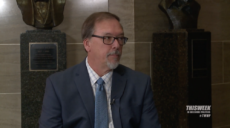JEFFERSON CITY, Mo. — Jane Suozzi’s daughter, Kim, knowingly and willingly broke the law in Missouri. Diagnosed with brain cancer shortly before graduating from Truman State University in 2011, Kim researched every option available.
“She was very bright and passionate and when the doctors gave her two years to live, she did everything she could to access experimental treatments to treat her brain tumor,” Jane Suozzi said.
That research led Kim to a clinical trial in Israel where researchers were studying cannabis in combination with chemotherapy. According to Jane Suozzi, Kim “took the plunge on her own.”
“Kim viewed marijuana the same as all the other experimental options she pursued. She didn’t enjoy it but it gave her some additional hope and sometimes relieved her nausea,” Jane Suozzi said. Kim ultimately lost her battle to brain cancer in 22 months.
The use of marijuana, for any reason, is illegal under Missouri’s criminal code. Federally, the Controlled Substances Act of 1970 classifies all forms of cannabis as a Schedule I drug.
Legislation introduced by Rep. Jim Neely — who lost his daughter two years ago — would very narrowly open up the use of “medical” cannabis.
HB 1554 expands “the definition of investigational drugs to include medical marijuana that may have passed out of clinical trials” according to Neely, which would allow those with terminal illnesses — like Kim — the option to access marijuana. The U.S. National Library of Medicine currently lists 42 active trials, and another 143 trails that are recruiting, regarding cannabis.
“This bill is a continuation of the ‘Right to Try’ legislation that passed in 2014,” Neely said.
The House General Laws Committee heard heart-wrenching, tear-jerking stories from veterans — one who drove 14 hours from Colorado — mothers, a former police officer, a cancer survivor and witnesses on the benefits of marijuana for medical purposes.
The veterans had a major caveat in the testimony offered — they were speaking to a broader scope than covered by the bill. As written, the legislation would not encompass most of their situations and experiences. It wouldn’t apply to a veteran with PTSD or for pain management or any situation that isn’t classified as terminal.
“I wish this went further than it does,” Rep. Peter Merideth said. “It bothers me that you have to be dying to access this.”
Neely isn’t opposed to expanding the scope of the legislation in the future but for now, he would like to see it go forward with the terminal individual to “get feel for how we are going to move forward with this.”
“If it is effective, why not expand it?” Neely asked.
Several of the witnesses advocated for that very thing but one veteran recognizes this bill as an “initial key step that absolutely needs to be taken.”
That’s not to say the legislation is without flaws. The main opposition point is that this would put Missouri at odds with federal law.
“People who comply with this law will be in violation of federal law,” a representative from the Missouri Association of Prosecuting Attorney said. “States don’t nullify federal law. It creates confusion.”

Alisha Shurr was a reporter for The Missouri Times and The Missouri Times Magazine. She joined The Missouri Times in January 2018 after working as a copy editor for her hometown newspaper in Southern Oregon. Alisha is a graduate of Kansas State University.

















